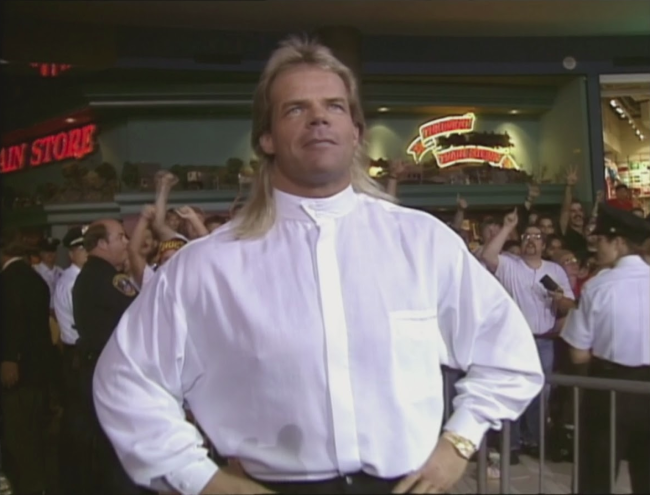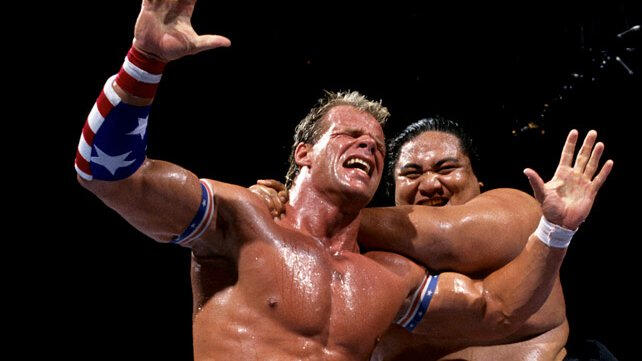
Narcissist to American Hero – The Ups and Downs of Lex Luger in the WWF
The fans cheered in unison in the Palace, as red, white and blue balloons cascaded from the sky like a summer rain. The American hero Lex Luger smiled triumphantly atop the burly shoulders of Rick and Scott Steiner, as his opponent, the WWF champion Yokozuna, lay flat on his back on the outside of the ring. It was a joyous occasion, when the foreign menace had been put down by the might of the United States. But it was a phallic victory, for despite getting his arms raised, Lex was not going home with the WWF Title. He had not pinned Yokozuna square in the center of the ring, managing only a count-out. After such a big build, this was already the beginning of the end of Lex as a main event force in the WWF.
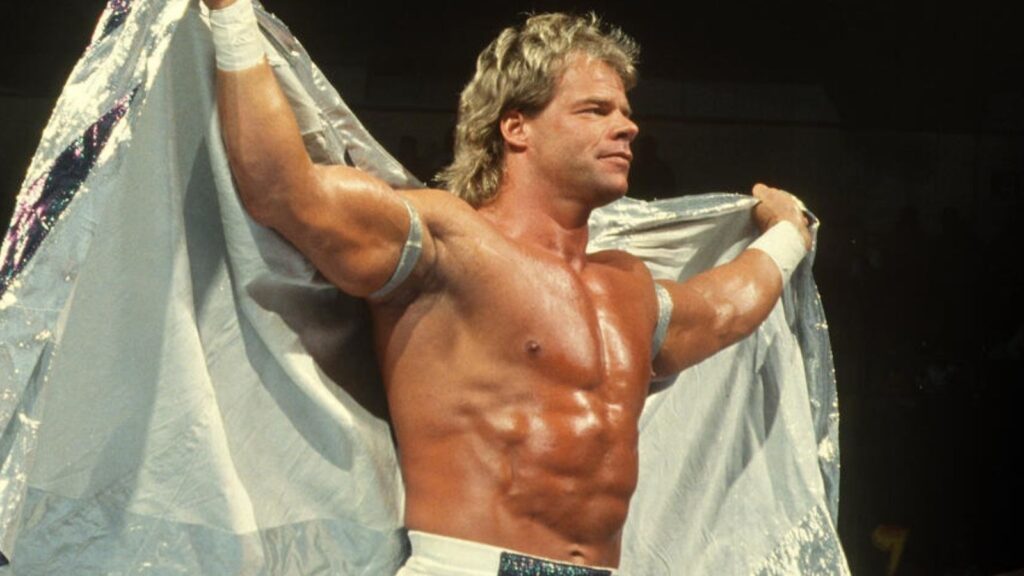
Lex Luger signed with Titan Sports in 1992, not as a wrestler but as an announcer for Vince McMahon’s other project, the World Bodybuilding Federation. Despite being on top of the card, Luger negotiated a release from WCW, which stipulated that he could not wrestle in the WWF for a period of time. The WBF fell over after their second pay-per-view, which Luger missed due to a motorcycle accident.
By the time of the 1993 Royal Rumble, Luger was now freed up to become a WWF Superstar. Bobby Heenan put on his best salesman shoes to hype up a man who was “beyond perfection,” a sly reference to Mr Perfect, who had left ‘The Brain’ at the end of 1992. Originally called Narcissus – a character from Greek mythology – it became “The Narcissist” when it was time for Luger to show his complete package in the squared circle.
Befitting this Godly presentation was his ring attire, a whitish gray ensemble, with a shiny cape that was removed before matches. His entrance music was a tune that may be heard in the heavens, and his promo style was that of a man who’s head was firmly in the clouds. He appeared to be carved from a block of granite and his matches often took some time starting as Flexy Lexy admired himself in front of a full-length mirror, even after the bell had rung.
Inevitably, “The Narcissist” was programmed with Mr. Perfect, and the two clashed at Wrestlemania IX. In a relatively short and uninspiring bout, Luger pinned Perfect. The feud was put on hold – permanently – when Perfect immediately transitioned into a feud with Shawn Michaels. Elsewhere on ‘Mania, Hulk Hogan had made his in-ring return, after having left the company at the previous year’s Wrestlemania to pursue an acting career. ‘The Hulkster’ had returned a few months prior to stand by his friend Brutus Beefcake, after he was viciously assaulted by Tag Team champions, Money Inc. The attack had been so brutal that it bothered Money Inc’s manager Jimmy Hart, who suddenly transformed into a Hulkamaniac.
But Hulk’s run in the WWF would not be a long one, despite beating Yokozuna in an impromptu ‘match’ to become WWF champion at the end of Wrestlemania. At the next pay-per-view in June (King of the Ring), Hogan dropped the belt back to Yokozuna. Hulk would appear on a European tour and then quietly leave the Federation again. Earlier, Luger had been bundled out of the King of the Ring tournament in the first round, after going to a fifteen minute draw with Tatanka. Regardless, big things were in store for Lex Luger in the wake of Hogan’s departure.
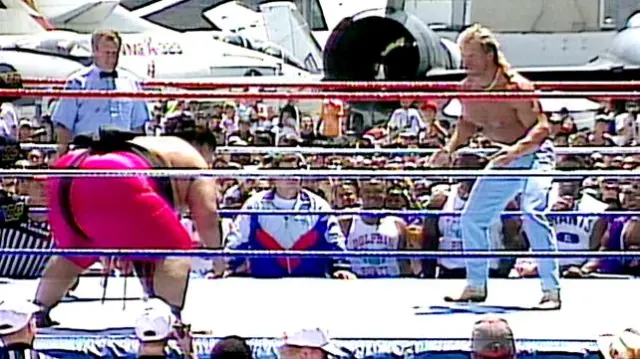
In the blink of an eye, Luger went from being a self-serving, incredibly arrogant rulebreaker to a humble hero when he arrived on board the USS Intrepid on Independence Day to confront Yokozuna. In our article on all things WWF in the year 1993, we go through all of this, but the gist was that Mr Fuji (Yoko’s manager) wanted to further humiliate America by having a celebration for Yokozuna winning the WWF championship, and humble America once again. It was the “Bodyslam Challenge,” and despite some good attempts, the five hundred pound plus champion was still not off his feet. Luger arrived in dramatic style in a helicopter, and after brushing aside a bewildered Bobby Heenan, rocked Yoko with his running forearm and managed to pick up and drop Yokozuna to the canvas.
Events moved quickly. Luger suddenly was a babyface, and a contract was signed for him to face Yoko at the upcoming Summerslam. Lex was now an American patriot defending the WWF from foreign menaces. To get the country behind him, Luger embarked on an expensive “Call to Action” campaign, traveling around in a red-white-and-blue-bus, dubbed the “Lex Express.” To further set the scene and provide the mood behind this sudden patriotic fervor, other foreign heels arrived on the scene, such as Ludvig Borga from Finland, and evil French Canadians, The Quebecers (Jacques and Pierre).
And then, after all that hype and build, Lex only won by count-out. Somewhere along the way, Vince had changed his mind. Luger gritted his teeth through more celebrating backstage and was challenged by the newcomer Borga, a Finnish bodybuilder, boxer and wrestler who turned his nose up at the pollution and decadence of the United States. When Survivor Series rolled around, it was Lex’s ‘All American’s’ taking on Yokozuna and his ‘Foreign Fanatics.’ While Lex was the sole survivor after pinning Borga, Yokozuna would end up feuding with The Undertaker going into 1994.
The loss to Yokozuna at Summerslam was costly for Lex’s career, but also in storyline terms. When Luger signed the contract for Summerslam, he was informed by Yoko’s new loudmouth American spokesperson Jim Cornette that he had one and only one shot at the title. Lex had fallen short, but as was tradition, he could get another chance if he won the Royal Rumble in the new year. Fuji connived to prevent Luger from getting a second match with Yokozuna by drafting in Tenryu and The Great Kabuki to appear in the Rumble. They were not a factor, but, for the second time, Lex stumbled, when he and Bret went over the top rope together to end the Rumble. The referees couldn’t come to a clear and concise decision, so WWF President Jack Tunney stepped in and made Lex and Bret “co-winners.”
Wrestlemania X had to be where Lex made his stand. He had faltered at Summerslam ’93 despite a huge build up, but had regathered to at least co-win the Rumble to earn another title shot. Yokozuna had managed to get past The Undertaker in a casket match at the Rumble (albeit with the help of the entire heel locker room). Still, Yokozuna was the champion, and Lex could put the Summerslam count-out behind him by definitively beating him on at the ‘grandest stage of them all.’ But February 22, 1994 may have sealed Lex’s fate.
It was at the February 22 Superstars taping that Vince tried a little experiment. This is also detailed in our WWF in Review for 1994 article, where in an non-televised segment, Vince had Lex announced as the new WWF champion to gauge the fan’s reaction. Apparently, it was not to McMahon’s liking, and perhaps he also finally started to believe that Bret Hart was the man he needed all along. Because at Wrestlemania X at Madison Square Garden on March 10, it was a Canadian hero – Bret Hart – who left as the WWF champion.
Lex’s match with Yokozuna featured an old foe – Mr Perfect – as special referee, and perhaps due to past grievances, Perfect officiated poorly and ended up disqualifying a frustrated Luger after being shoved for not counting a pinfall. On the other hand, Bret shook off being upset in the opening match by younger brother Owen to go on and beat Yokozuna. Simply put, McMahon recognised – and was correct – that the fans liked Bret more than Lex.
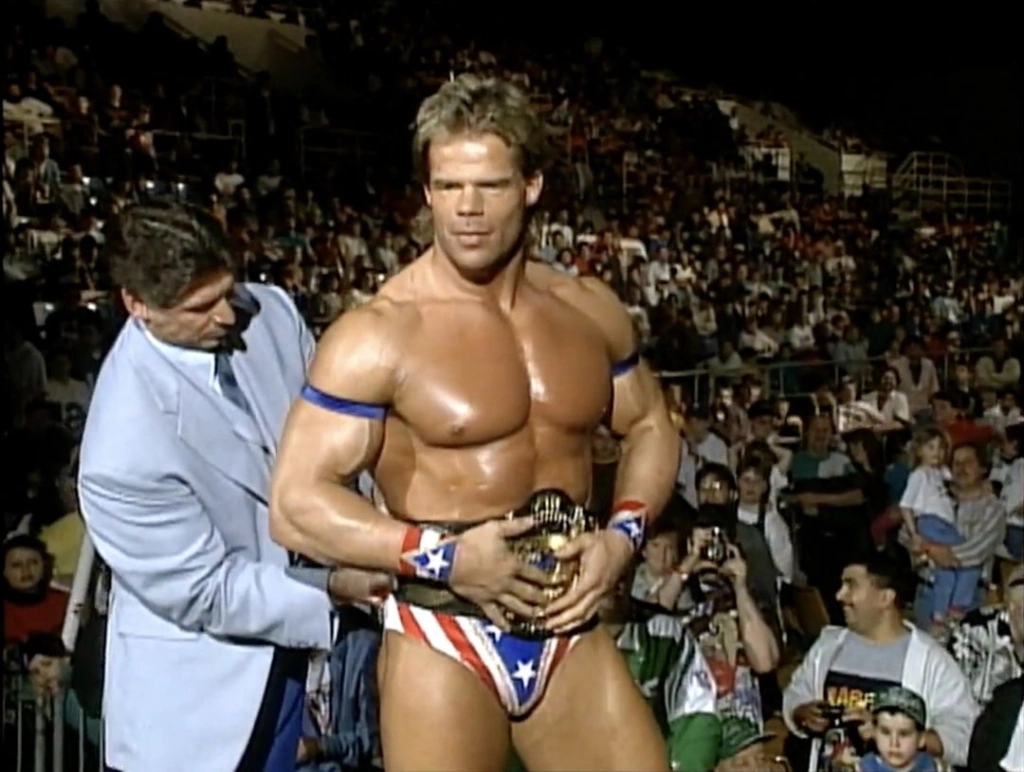
After the second attempt at becoming WWF champion failed, Lex was put in a middle-of-the-road feud with former friend, Tatanka. It was the Native American who first accused Lex of selling out to Ted Dibiase, who was quickly assembling a Million Dollar Corporation. At Summerslam ’94, it turned out to be Tatanka who had taken Dibiase’s money. At the Survivor Series, Luger was unable to repeat his success of the previous year, as he was pinned by blast-from-the-past King Kong Bundy. Less than twenty four hours after Survivor Series, where Bret lost the WWF title to Bob Backlund, Diesel Jacknifed and pinned Backlund in under ten seconds at Madison Square Garden, and became the face of the so-called “New Generation,” further pushing Lex down in the rankings.
Lex did make a strong showing at the Royal Rumble in 1995, and was part of the final four before being eliminated by eventual winner, Shawn Michaels. He was put into a team with The British Bulldog (The Allied Powers), until Bulldog turned on Luger. But a feud didn’t get into second gear. Lex’s contract was up for renewal, and he had sent feelers to his old buddy Sting at WCW, who bugged Eric Bischoff enough to offer him a contract.
There are a combination of factors that contributed to the quick rise and fall of Lex Luger in the WWF. It is not to say that Lex slid down the card after Wrestlemania X and his contract allowed to expire. Luger was still in the frame and had his supporters. But after the paltry count-out at Summerslam ’93, and falling short again at Wrestlemania X, Lex struggled to regain the faith Vince McMahon previously had in him. He also didn’t connect with the fans the way McMahon had hoped, for which this is not entirely Luger’s fault. In manufacturing another Hulk Hogan, Lex was not allowed to be himself and get over on his own. He was filling the shoes of a beloved figure who had done so much to build the WWF in the past, and Luger was meant to emulate his feats in a short period of time.
Luger was also up against Bret Hart as the top babyface hero, which was a natural fit for ‘The Hitman,’ and not so much for Lex. Bret seemed much more comfortable with the fans and garnering respect from them. Bret’s journey had been a tough one, going back to when he first entered the Federation in 1984. For years, Bret flew under McMahon’s radar, and only gathered momentum when he and brother-in-law Jim Neidhart made their mark as a tag team, one that would be deemed as one of the greatest of all time. Then, he was allowed to spread his wings as a single and become a fine Intercontinental champion, but there were other bigger obstacles in Bret’s path. With the steroid scandal rocking the WWF to their very core, suddenly there was a need for more men like Bret Hart, who presented a much better image for the company, even if it did go against Vince’s usual pattern of pushing muscle-bound freaks to the main events. Simply put, Bret was much more relatable. Then, the big seven footer Diesel made his way into the main event picture as a babyface, providing more stiff competition for Lex to overcome.
In the end, Luger made a solid business decision. He took the gamble to go to the competition, knowing that his stock had fallen badly in the WWF. This proved to be a wise move, as he became a key weapon in the Monday Night War by his audacious showing on the debut Monday Nitro. He would continue to be a top draw until around 1998, when the wheels began to fall off the wagon of WCW itself. But that’s a story for another time…
